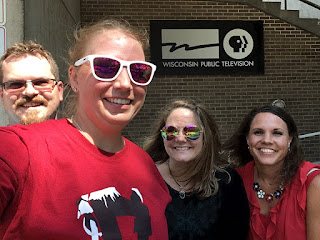Guided Science Research with Mini Technology Lessons Integrated Within
We have been doing a lot of student guided research in physical science class. During a lot of that research, a few small mini-technology lesson opportunities have popped up. Upon concluding our unit on speed, velocity, and acceleration, my team teacher and I thought it would be appropriate to research how a speedometer works and how a radar gun works, which will eventually lead us into a unit on waves. Students in teams of 3 or 4 researched one of these two scenarios and a few groups were randomly selected to share back their research to the class. Upon sharing back to their classmates, each team was asked to create a question that they would like to research further on either topic. Groups were then asked to pick a question to research, from the list we developed as a class. Surprisingly, there were no arguments or demonstrations of frustration from students, that they didn't get a topic that they were interested in. Students seemed VERY engaged the entire time. Students used both the classroom desktops and their personal mobile devices to do the research.
This lesson led into "how to search like a spy." I realized very quickly that this was the opportunity to ask students what other words they would search if they weren't coming up with the topic that they were looking for. There was some frustration exhibited, in the fact that they had to dig to find the answer and change their search strategy. In a lot of cases, there weren't articles on the questions that they were asking, rather they needed to search a bit more broad for things such as "police radar training," to find the answers of some of the questions they were looking for. We also talked about the impact of searching with quotes. I showed them the impact of dropping hits from 4 million to 12 thousand, just by adding quotes. My intent is to do a more detailed lesson on searching when an opportunity for a research paper arises. This also led to the discussion of what is a credible source, and what you look for in a credible source. I would also like to spend some more time on this in the future. Groups did a fantastic job sharing out the information that they found. If a group wasn't so secure on the ideas that a group came up with, they both asked questions and other groups contributed to the discussion. A great lesson that was student led.
We also confirmed that story about me getting pulled over twice for speeding as a result of having the wrong size tires on my car was TRUE, despite the disbelief expressed by my students. My third hour class, however, still doesn't believe me because I'm YOUNG...yet, they somehow manage to buy into all of the science concepts that I teach them. If I were to give stars for level of engagement for this lesson by all students, I would give it a 4.8. One of my best and most favorite lessons!




Comments
Post a Comment